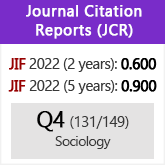Secularization and Acceleration. Theological foundations of the sociological concept «social acceleration»
DOI:
https://doi.org/10.3989/ris.2013.08.08Keywords:
Acceleration, Historical Time, Modernity, SchorteningAbstract
The term «time shortening» is related to the Judeo-Christian tradition that announces the end of time as the moment when God, honoring the elected, will shorten the days and hours, for without doing it no one would be saved. While salvation is, in this sense, associated with the divine intervention, the thesis of acceleration reverses the above formula by blaming the human being for having narrowed the time. However, if time shortening is aimed at the salvation of the world in the apocalypse, where does the acceleration point, that is, the secularized notion of time shortening? What justifies the increasing speed in the realization of tasks that formerly took considerable time and today are made in a few hours? How to justify the frenzy to get what is intended in the shortest time possible?.
Downloads
References
AA. VV. 1999. Biblia de Jerusalén. Bilbao: Desclée de Brouwer.
Agamben, G. 2009. Nuditá. Roma: Nottetempo.
André, J., S. Dreyfus-Asséo y F. Hartog. 2010. Les récits du temps. Paris: Presses Universitaires de France.
Arendt, H. 1968. Between Past and Future: Eight Exercises in Political Thought. New York: Viking Press.
Benjamin, W. 1985. Discursos interrumpidos I. Buenos Aires: Taurus.
Beytía, P. 2012. «Creatividad situada, contingencia y modernidad. Entrevista a Hans Joas». Andamios. Revista de Investigación Social 19:361-389.
Blumenberg, H. 2007. Tiempo de la vida y tiempo del mundo. Valencia: Pre-textos.
Blumenberg, H. 2008. La legitimación de la Edad Moderna. Valencia: Pre-Textos.
Borovinsky, T. 2011. «Escatología, política y administración a partir de la obra de Alexandre Kojève: El problema del "fin de la historia"». Revista Pléyade 8:63-83.
Delekat, F. 1958. Über den Begriff der Säkularisation. Heidelberg: Quelle und Meyer.
Elias, Norbert. 1989. Sobre el tiempo. México: Fondo de Cultura Económica.
Hartog, F. 2007. Regímenes de Historicidad. México: Iberoamericana.
Husserl, E. 1985. Vorlesungen zur Phänomenologie des inneren Zeitbewusstseins. Halle a. d. S. Max Niemeyer Verlag. 1928; Husserliana. Vol X. Felix Meiner Verlag, Hamburg.
Husserl, E. 2002. Lecciones de fenomenología de la conciencia interna del tiempo. Madrid: Trotta. PMid:11981100
Heidegger, M. 2002. Sein und Zeit. Tu.bingen: Max Niemeyer Verlag.
Heidegger, M. 2005. Ser y Tiempo. Santiago: Universitaria.
Joas, H. 2004. Braucht der Mensch Religion? Freiburg: Herder. PMid:15175403
Joas, H. 2009. «Die säkulare Option. Ihr Aufstieg und ihre Folgen». Deutsche Zeitschrift fu.r Philosophie 57:293-300.
Koselleck R. 2000. Zeitschichten. Studien zur Historik. Frankfurt: Suhrkamp.
Koselleck R. 2001. Los estratos del tiempo. Estudios sobre la historia. Barcelona: Paidós.
Koselleck R. 2003. Aceleración, prognosis y secularización. Valencia: Pre-textos.
Kurfess, Alfons. 1951. Sibyllinische Weissagungen. Urtext und Übersetzung. Mu.nchen: Heimeran
Löwith, Karl. 2008. De Hegel a Nietzsche. La quiebra revolucionaria del pensamiento en el siglo XIX. Buenos Aires: Katz Editores.
Löwith, Karl. 1949. Meaning in History. The Theological Implications of the Philosophy of History. Chicago: University of Chicago Press.
Merleau-Ponty, M. 1945. Phénoménologie de la perception. Paris: Gallimard.
Merleau-Ponty, M. 2000. Fenomenología de la percepción. Barcelona: Península.
Ricoeur, P. 1991. «Le temps raconté». Le Courrier de’l Unesco 4:11-15.
Rosa, H. 2012. Aliénation et accélération. Vers une théorie critique de la modernité tardive. Paris: La Découverte.
Rosa, H. 2011. "Aceleración social: consecuencias éticas y políticas de una sociedad de alta velocidad desincronizada". Persona y Sociedad 25:9-49.
Scheuermann, W. E. & H. Rosa. 2009. High-Speed Society. Social Acceleration, Power and Modernity. University Park, PA: The Pennsylvania State University Press.
Stiegler, B. 2002. La técnica y el tiempo. Tomo I. País Vasco: Hiru.
Sutherland, T. 2014. «Getting nowhere fast: A teleological conception of socio-technical acceleration». Time & Society 23:48-68. http://dx.doi.org/10.1177/0961463X13500793
Taub, E. 2011. «Universalidad y mesianismo: Para una teología política desde el pensamiento de Hermann Cohen». Revista Pléyade 8:85-102.
Taylor, Ch. 2007. A Secular Age. Cambridge: Cambridge University Press.
Torres, F. 2013. «Tiempo Moderno. Una paradoja entre diversificación y homogeneización». Documentos CAIP n.° 3. Centro de Análisis e Investigación Política, Santiago de Chile.
Virilio, P. 1977. Vitesse et politique. Paris: Galilée.
Published
How to Cite
Issue
Section
License
Copyright (c) 2015 Consejo Superior de Investigaciones Científicas (CSIC)

This work is licensed under a Creative Commons Attribution 4.0 International License.
© CSIC. Manuscripts published in both the printed and online versions of this Journal are the property of Consejo Superior de Investigaciones Científicas, and quoting this source is a requirement for any partial or full reproduction.All contents of this electronic edition, except where otherwise noted, are distributed under a “Creative Commons Attribution 4.0 International” (CC BY 4.0) License. You may read here the basic information and the legal text of the license. The indication of the CC BY 4.0 License must be expressly stated in this way when necessary.
Self-archiving in repositories, personal webpages or similar, of any version other than the published by the Editor, is not allowed.

















